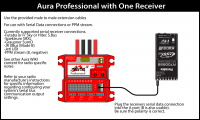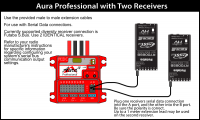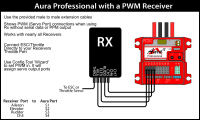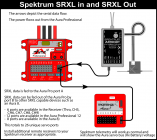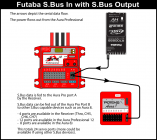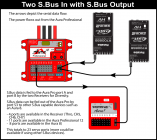Difference between revisions of "Aura/Professional"
From Flex Innovations Wiki
(→Current Manuals) |
m |
||
| Line 1: | Line 1: | ||
{{DISPLAYTITLE:Aura Profession Series Wiki}} | {{DISPLAYTITLE:Aura Profession Series Wiki}} | ||
| − | == Aura Professional | + | == Aura Professional Overview == |
| − | + | * Designed perfect for your larger and more complex fixed wing models! | |
| − | * | + | * Two isolated high power battery inputs with Low-Voltage LED Indicators |
| − | * | + | * Automatic Battery Switching |
| − | ** | + | * Dual Receiver Inputs to support SBUS Diversity |
| − | ** | + | * External Sensor Port (Optional) to connect a vibration hardened external sensor for the harshest vibration and noisy enviornments (Turbines, 70cc+ Engines, etc) |
| − | * | + | * Up to 12 customizable Gyro-capable Servo Outputs for complex airplanes |
| − | *[https://www.flexinnovations.com/product/aura-professional/ Aura Professional Series Product Web Page] | + | * Quick Trim Buttons for Easy Quick Trim |
| + | * Quick Change Buttons to Change Gyro Correction directions, Flight Mode 1 3Axis/6Axis, Aileron/Elevon setup, and Gyro Gain Scaling without a PC | ||
| + | * [https://www.flexinnovations.com/product/aura-professional/ Aura Professional Series Product Web Page] | ||
| − | + | [[Aura/Professional/Featues|Click here for more details on these features]] | |
| − | + | ||
| − | + | ||
| − | + | ||
| + | == Current Manuals == | ||
| + | * [http://resources.flexinnovations.com/files/AuraPro_QuickStartOverview_v1p25_20250725 Aura Professional Quick Start Overview (PDF) - English - Firmware v1.25+] | ||
| + | ** New for July 2025 to documents firmware v1.25+ features | ||
| + | * [http://resources.flexinnovations.com/files/Aura_Professional_User_Guide_v1_1.pdf Aura Professional User Guide (PDF) - English] | ||
| + | * [http://resources.flexinnovations.com/files/Aura_Professional_User_Guide_V1_German.pdf Aura Professional User Guide (PDF) - German] | ||
| − | |||
| − | |||
| − | |||
| − | |||
| − | |||
| − | + | == Aura Pro Specific Tips == | |
| − | + | ||
| − | + | === Battery Choices === | |
| − | + | ||
| − | + | ||
| − | + | ||
| − | + | ||
| − | + | ||
| − | + | ||
| − | + | ||
| − | + | ||
| − | + | ||
| − | + | ||
| − | + | ||
| − | + | ||
| − | + | ||
| − | + | ||
| − | + | ||
| − | + | ||
| − | + | ||
| − | ===Battery Choices=== | + | |
[[File:Pro Power and Features.png|thumb|upright=0.5|right|Power for Aura 8 and 12 Professional]] | [[File:Pro Power and Features.png|thumb|upright=0.5|right|Power for Aura 8 and 12 Professional]] | ||
The choice of the battery/power supply is completely up to the user. Here are some suggestions based on our teams experience. | The choice of the battery/power supply is completely up to the user. Here are some suggestions based on our teams experience. | ||
| Line 68: | Line 48: | ||
</gallery> | </gallery> | ||
| − | == | + | |
| − | + | === Quick Trim with Aura Professional === | |
| − | * | + | [[File:Pro_Quick_Trim.png|thumb|upright=0.5|right|Buttons and Status Window]] |
| − | * | + | This process transfers the trim in your transmitter into the Aura's subtrim. |
| + | *Fly and trim in any selected Flight Mode. Land. | ||
| + | *Leave '''Transmitter''' powered '''ON''' in the selected Flight Mode and set it aside. | ||
| + | *Power '''OFF''' the Aura Professional. | ||
| + | *Hold down the '''Button #2''' and power '''ON''' the Aura. After about '''5 seconds''', release the Button. You should observe a '''slow-flashing Blue LED''' in the Aura status window. | ||
| + | *Press and hold '''Button #2''' for about '''5 seconds'''. You should observe the '''Blue LED flashing more quickly'''. The trims are now stored in the Aura. | ||
| + | *Power '''OFF''' the Aura. Center the transmitter trims. | ||
| + | *You are now finished, and you can power up the Aura and fly! | ||
| + | |||
| + | === Connect to Aura Config Tool to Aura Professional === | ||
| + | * To Connect the Aura Professional to the Aura Config Tool/PC, The Switch must be ON or Removed to Connect the Aura Professional to the Aura Config Tool | ||
| + | ** The USB can power the Aura but it will not power the servos. You do not need to Power the Aura Pro with batteries to connect to the PC, but the switch must be ON or removed. | ||
| + | |||
| + | ===Programming the Battery LEDs=== | ||
| + | *Use the Aura Config Tool to set the thresholds for the red LED to come on. (hover the mouse cursor over key words for fly-out help) | ||
| + | **The first 'higher' voltage sets the point where the Red LED will '''BLINK''' if lower. | ||
| + | **The second 'lower' voltage sets the point where the Red LED will be '''ON''' if lower. | ||
| + | |||
| + | === External Sensor === | ||
<noinclude>[[Category:Aura|Aura]]</noinclude> | <noinclude>[[Category:Aura|Aura]]</noinclude> | ||
Revision as of 20:33, 25 July 2025
Aura Professional Overview
- Designed perfect for your larger and more complex fixed wing models!
- Two isolated high power battery inputs with Low-Voltage LED Indicators
- Automatic Battery Switching
- Dual Receiver Inputs to support SBUS Diversity
- External Sensor Port (Optional) to connect a vibration hardened external sensor for the harshest vibration and noisy enviornments (Turbines, 70cc+ Engines, etc)
- Up to 12 customizable Gyro-capable Servo Outputs for complex airplanes
- Quick Trim Buttons for Easy Quick Trim
- Quick Change Buttons to Change Gyro Correction directions, Flight Mode 1 3Axis/6Axis, Aileron/Elevon setup, and Gyro Gain Scaling without a PC
- Aura Professional Series Product Web Page
Click here for more details on these features
Current Manuals
- Aura Professional Quick Start Overview (PDF) - English - Firmware v1.25+
- New for July 2025 to documents firmware v1.25+ features
- Aura Professional User Guide (PDF) - English
- Aura Professional User Guide (PDF) - German
Aura Pro Specific Tips
Battery Choices
The choice of the battery/power supply is completely up to the user. Here are some suggestions based on our teams experience.
- We are primarily using LiPo and LiFe 2-cell batteries with high voltage servos and accessories for our Pro Class aircraft
- For smaller sized aircraft, each pack can be 1200 to 2500mAh
- For medium sized aircraft, each pack can be 2000 to 4000mAh
- For large sized aircraft, each pack can be 3000 to 6000mAh
- 15C or higher discharge ratings are generally a good choice solid voltage under load.
- EC3 Battery connectors should be used for high current capability.
- Flex Innovations sells several batteries intended for this use. They are linked on the product page.
- Our team generally does not use regulators. In the world of high voltage servos and lithium batteries, many consider the most reliable system is free of these regulators. In the past Spektrum (SPMVR6007, SPMVR6010) made ones that are since discontinued that can be used between each battery and the Aura Professional. The two regulators must be very well matched to keep the packs current draw balanced.
Aura Professional 8 and 12 Receiver Connection Diagrams (click to expand)
- If your Receiver has a working throttle port, use it for throttle
Quick Trim with Aura Professional
This process transfers the trim in your transmitter into the Aura's subtrim.
- Fly and trim in any selected Flight Mode. Land.
- Leave Transmitter powered ON in the selected Flight Mode and set it aside.
- Power OFF the Aura Professional.
- Hold down the Button #2 and power ON the Aura. After about 5 seconds, release the Button. You should observe a slow-flashing Blue LED in the Aura status window.
- Press and hold Button #2 for about 5 seconds. You should observe the Blue LED flashing more quickly. The trims are now stored in the Aura.
- Power OFF the Aura. Center the transmitter trims.
- You are now finished, and you can power up the Aura and fly!
Connect to Aura Config Tool to Aura Professional
- To Connect the Aura Professional to the Aura Config Tool/PC, The Switch must be ON or Removed to Connect the Aura Professional to the Aura Config Tool
- The USB can power the Aura but it will not power the servos. You do not need to Power the Aura Pro with batteries to connect to the PC, but the switch must be ON or removed.
Programming the Battery LEDs
- Use the Aura Config Tool to set the thresholds for the red LED to come on. (hover the mouse cursor over key words for fly-out help)
- The first 'higher' voltage sets the point where the Red LED will BLINK if lower.
- The second 'lower' voltage sets the point where the Red LED will be ON if lower.

